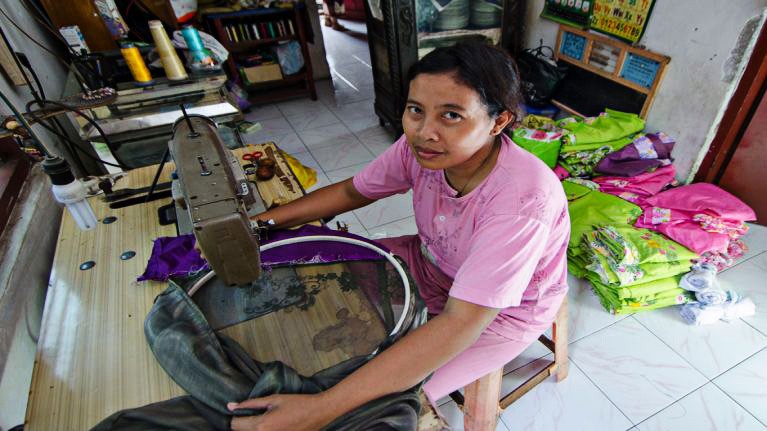Shoe brand Elle denies using underpaid homeworkers
Homeworkers in Penjaringan, North Jakarta, manually sew 10 to 25 pairs of shoes every day for well-known international brands, including Elle.
Change Size
 Underpaid – A homeworker in Indonesia. The International Labor Organization (ILO) has called on countries to provide better work condition for homeworkers, including a decent wage and improved work safety.
(Courtesy of ILO/-)
Underpaid – A homeworker in Indonesia. The International Labor Organization (ILO) has called on countries to provide better work condition for homeworkers, including a decent wage and improved work safety.
(Courtesy of ILO/-)
I
n Indonesia, luxury shoes made by international brands such as Elle, are often priced at millions of rupiah. Ironically, some of these products may have been stitched by a woman living in crowded slum areas of big cities such as Jakarta and Tangerang, on a wage of only Rp 3,000 (22 US cents) for each pair of shoes she stitches, though Elle denies this is the case.
According to research by the Trade Union Rights Center (TURC) carried out between July 2015 and January 2016, homeworkers in Penjaringan, North Jakarta, manually sew 10 to 25 pairs of shoes every day for well-known international brands, including Elle. They work for 10 to 12 hours per day and have no social security.
Most of the homeworkers are women because it allows them to juggle working on their sewing and taking care of household chores all at once, a TURC official said.
“That's just the tip of the iceberg. It’s hard to count how many homeworkers are involved in such [underpaid] jobs because they’re working inside their houses,” TURC program coordinator I Gede Pandu Wirawan said recently.
Elle Indonesia product executive Devy Herawati said the company did not approve of such conditions, claiming that most Elle products were made in its own factory.
“Only small parts of our products – around 20 to 30 percent – come from external suppliers,” she said in a recent interview.
“We only receive finished products from our external suppliers and if they have given the job [of sewing the shoes] to homeworkers, it is out of our knowledge,” said Devy.
According to the International Labor Organization (ILO), a homeworker can be defined as someone who, for a fixed rate of remuneration, carries out work in his or her home for an employer who is not the final consumer of the product or service provided.
However, specific rules on homeworkers, Pandu said, were not stipulated in Indonesia's 2003 Labor Law. Hence, he called on the government to issue a regulation that protected the long-neglected rights of homeworkers, including the right to a decent wage and to work safety. (vps/ebf)









